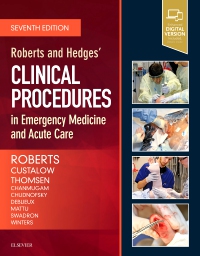
Roberts and Hedges’ Clinical Procedures in Emergency Medicine and Acute Care, 7th Edition
Hardcover

Newer Edition Available
Roberts and Hedges’ Clinical Procedures in Emergency Medicine and Acute Care
-
- Provides clear, detailed information for practitioners at all levels of experience, – from trainees who are unfamiliar with a specific procedure to those with experience in the technique.
-
- Covers the latest equipment, devices, drug therapies, and techniques you need to know for the effective practice of emergency medicine and acute care.
- Features new and updated information on ultrasound throughout the text, including Ultrasound Boxes that are expertly written and richly illustrated with photographs and clinical correlative images.
- Includes more Procedure Boxes that allow you to see entire procedures at a glance, functioning as a mini-atlas that allows you to quickly grasp how to perform a procedure.
- Contains more than 100 new figures—of more than 3,500 images total—including new color photographs, new Ultrasound Boxes, and new algorithms.
- Features a new chapter on Procedures in the Setting of Anticoagulation.
- Covers hot topics such as novel loop abscess drainage technique, ENT techniques, and ophthalmology techniques, as well as procedures performed by acute care practitioners such as sedation of the agitated patient, alternate methods of drug delivery, and common errors and complications in the acute care setting.
- Expert Consult™ eBook version included with purchase. This enhanced eBook experience allows you to search all of the text, figures, and references from the book on a variety of devices. You’ll also have access to nearly 250 procedural videos.
-
Section I: Vital Signs and Patient Monitoring Techniques
Chapter 1. Vital Sign Measurement
Chapter 2. Devices for Assessing Oxygenation and Ventilation
Section II: Respiratory Procedures
Chapter 3. Basic Airway Management and Decision Making
Chapter 4. Tracheal Intubation
Chapter 5. Pharmacologic Adjuncts to Intubation
Chapter 6. Cricothyrotomy and Percutaneous Translaryngeal Ventilation
Chapter 7. Tracheostomy Care
Chapter 8. Mechanical Ventilation
Chapter 9. Thoracentesis
Chapter 10. Tube Thoracostomy
Section III: Cardiac Procedures
Chapter 11. Techniques for Supraventricular Tachycardias
Chapter 12. Defibrillation and Cardioversion
Chapter 13. Assessment of Implantable Devices
Chapter 14. Basic Electrocardiograph Techniques
Chapter 15. Emergency Cardiac Pacing
Chapter 16. Pericardiocentesis
Chapter 17. CPR and Artificial Perfusion during Cardiac Arrest
Chapter 18. Resuscitative Thoracotomy
Section IV: Vascular Techniques and Volume Support
Chapter 19. Pediatric Vascular Access and Blood Sampling Techniques
Chapter 20. Arterial Puncture and Cannulation
Chapter 21. Peripheral Intravenous Access
Chapter 22. Central Venous Catheterization and Central Venous Pressure Monitoring
Chapter 23. Venous Cutdown
Chapter 24. Indwelling Vascular Devices: Emergency Access and Management
Chapter 25. Intraosseous Infusion
Chapter 26. Alternative Methods of Drug Administration
Chapter 27. Autotransfusion
Chapter 28. Transfusion Therapy: Blood and Blood Products
Section V: Anesthetic and Analgesic Techniques
Chapter 29. Local and Topical Anesthesia
Chapter 30. Regional Anesthesia of the Head and Neck
Chapter 31. Regional Anesthesia of the Thorax and Extremities
Chapter 32. Intravenous Regional Anesthesia
Chapter 33. Systemic Analgesia and Sedation for Procedures
Section VI: Soft Tissue Procedures
Chapter 34. Principles of Wound Management
Chapter 35. Methods of Wound Closure
Chapter 36. Foreign Body Removal
Chapter 37. Incision and Drainage
Chapter 38. Burn Care Procedures
Section VII: Gastrointestinal Procedures
Chapter 39. Esophageal Foreign Bodies
Chapter 40. Nasogastric and Feeding Tube Placement
Chapter 41. Balloon Tamponade of Gastroesophageal Varices
Chapter 42. Decontamination of the Poisoned Patient
Chapter 43. Peritoneal Procedures
Chapter 44. Abdominal Hernia Reduction
Chapter 45. Anorectal Procedures
Section VIII: Musculoskeletal Procedures
Chapter 46. Prehospital Immobilzation
Chapter 47. Management of Amputations
Chapter 48. Extensor and Flexor Tendon Injuries in the Hand, Wrist, and Foot
Chapter 49. Management of Common Dislocations
Chapter 50. Splinting Techniques
Chapter 51. Podiatric Procedures
Chapter 52. Treatment of Bursitis, Tendinitis, and Trigger Points
Chapter 53. Arthrocentesis
Chapter 54. Compartment Syndrome Evaluation
Section IX: Genitourinary Obstetric, and Gynecologic Procedures
Chapter 55. Urologic Procedures
Chapter 56. Emergency Childbirth
Chapter 57. Gynecologic Procedures
Chapter 58. Examination of the Sexual Assault Victim
Section X: Neurologic Procedures
Chapter 59. Management of Increased Intracranial Pressure and Intracranial Shunts
Chapter 60. Spinal Puncture and Cerebrospinal Fluid Examination
Chapter 61. Special Neurologic Tests and Procedures
Section XI: Ophthalmologic, Otolaryngologic, and Dental Procedures
Chapter 62. Ophthalmologic Procedures
Chapter 63. Otolaryngologic Procedures
Chapter 64. Emergency Dental Procedures
Section XII: Special Procedures
Chapter 65. Procedures Pertaining to Hypothermia and Hyperthermia
Chapter 66. Ultrasound
Chapter 67. Bedside Laboratory and Microbiologic Procedures
Chapter 68. Standard Precautions and Infectious Exposure Management
Chapter 69. Physical and Chemical Restraint
Chapter 70. Noncardiac Implantable Devices
Chapter 71. Radiation in Pregnancy and Clinical Issues of Radiocontrast Agents
Chapter 72. Procedures in the Setting of Anticoagulation
Appendix I: Commonly Used Formulas and Calculations


 as described in our
as described in our 